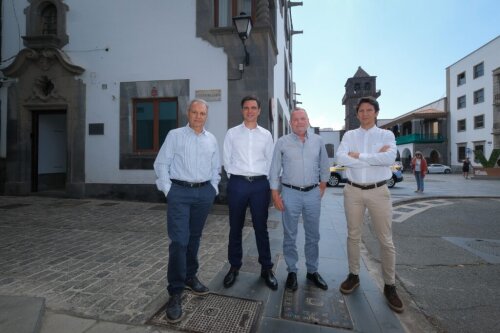Best Nonprofit & Charitable Organizations Lawyers in Las Palmas de Gran Canaria
Share your needs with us, get contacted by law firms.
Free. Takes 2 min.
List of the best lawyers in Las Palmas de Gran Canaria, Spain
About Nonprofit & Charitable Organizations Law in Las Palmas de Gran Canaria, Spain
Nonprofit and charitable organizations in Las Palmas de Gran Canaria operate within a specific legal framework established by Spanish national law and the regulations of the Canary Islands. These organizations, often dedicated to social, cultural, educational, environmental, or humanitarian goals, do not pursue profits for distribution among members or founders. Instead, they reinvest any surplus into their missions and activities. Setting up and running a nonprofit involves registering with the appropriate governmental bodies, complying with rules around governance, transparency, financial controls, fundraising, and sometimes meeting special requirements for public benefit status or tax exemptions.
Why You May Need a Lawyer
While starting or managing a nonprofit might seem straightforward, there are numerous legal areas where expert advice can prove invaluable. Common situations where you might need a lawyer include:
- Setting up or registering a new association or foundation
- Drafting or amending bylaws and articles of incorporation
- Navigating the legal requirements for fundraising and receiving donations
- Applying for special tax or public benefit status
- Managing contracts, agreements, and employment issues
- Ensuring compliance with annual reporting, accounting, and auditing regulations
- Resolving disputes within the organization or with third parties
- Adhering to data protection laws and managing donor information
- Advising on cross-border activities or international collaborations
- Dealing with potential penalties or investigations by regulatory authorities
Local Laws Overview
Nonprofit organizations in Las Palmas de Gran Canaria are subject to both national Spanish law and autonomous community regulations. The two main legal structures for nonprofits in Spain are "asociaciones" (associations) and "fundaciones" (foundations). Associations are generally for groups of people pursuing a common purpose, while foundations are typically established through an initial endowment provided by the founder(s).
Some of the core legal requirements include:
- Registration with the Registry of Associations or the Registry of Foundations of the Canary Islands
- Preparation of statutes and formal governance documents
- Obligations for transparency and accountability, such as annual accounts and activity reports
- Compliance with labor laws when hiring employees
- Rules for receiving, managing, and reporting on donations and public grants
- Possibility to obtain "declaración de utilidad pública" (public utility status) for greater benefits and recognition
- Taxation issues, including potential exemptions and obligations under both Spanish and Canary Islands tax regimes
Local municipalities in Las Palmas de Gran Canaria may also have specific regulations for nonprofits, especially concerning public events, fundraising in public places, or local collaboration agreements.
Frequently Asked Questions
What are the main types of nonprofit organizations I can establish in Las Palmas de Gran Canaria?
The most common types are associations and foundations. Associations are member-based organizations with a common purpose, while foundations are asset-based and created to serve a specific purpose set by the founder.
Do I need a minimum number of people to form an association?
Yes, Spanish law requires at least three people (founding members) to create an association.
What documents are required to register a nonprofit?
You will typically need the founding statutes or bylaws, identification of the founders, a registration application, and sometimes proof of initial assets (for foundations).
How do I obtain tax-exempt status for the organization?
You must follow specific legal and administrative procedures to be recognized as a charitable or public benefit entity. This often involves meeting stricter transparency and reporting requirements.
Are there any local authority approvals needed for fundraising?
Yes, in many cases, especially for public fundraising events, prior notification or authorization by the local council is necessary.
What are the annual reporting obligations?
Nonprofits must keep proper financial records and submit annual accounts and activity reports to the relevant registry or authority.
Can a nonprofit hire employees or pay salaries?
Yes, nonprofits can hire staff and pay salaries according to Spanish labor law. However, profits must not be distributed but reinvested into the organization's objectives.
How are donations treated under Spanish tax law?
Donations may be tax-deductible for donors if given to recognized public benefit organizations. The nonprofit must provide proper receipts and follow strict reporting rules.
What is the penalty for noncompliance with legal requirements?
Penalties can range from financial fines to the suspension or removal of the organization from official registries, depending on the severity of the breach.
How can I dissolve a nonprofit organization in Las Palmas de Gran Canaria?
Dissolution involves a formal process set out in the statutes and Spanish law, including settling debts, distributing remaining assets to similar nonprofit purposes, and official deregistration.
Additional Resources
If you need more information or support, consider the following resources:
- Government of the Canary Islands Department responsible for Justice and Associations
- Registry of Associations of the Canary Islands
- Registry of Foundations of the Canary Islands
- Ministry of Interior (Ministerio del Interior) for national rules on associations
- State Agency for Tax Administration (Agencia Tributaria) for tax-related matters
- Las Palmas City Council for local requirements and support programs
- Regional federations or umbrella organizations for nonprofits in the Canary Islands
Next Steps
If you require legal assistance regarding nonprofit or charitable organizations in Las Palmas de Gran Canaria, consider the following steps:
- Clearly define your goals and the intended activities of your future or existing organization
- Prepare all relevant documents such as draft statutes and member or asset lists
- Contact a local attorney specializing in nonprofit and charity law to review your plans and guide you through the registration and compliance process
- Stay informed about any changes in national or regional laws that may affect your organization
- Consider joining a local network for nonprofits to access shared resources and support
Consulting a specialized lawyer will help ensure your nonprofit is set up correctly, remains compliant, and is best positioned to achieve its mission in Las Palmas de Gran Canaria.
Lawzana helps you find the best lawyers and law firms in Las Palmas de Gran Canaria through a curated and pre-screened list of qualified legal professionals. Our platform offers rankings and detailed profiles of attorneys and law firms, allowing you to compare based on practice areas, including Nonprofit & Charitable Organizations, experience, and client feedback.
Each profile includes a description of the firm's areas of practice, client reviews, team members and partners, year of establishment, spoken languages, office locations, contact information, social media presence, and any published articles or resources. Most firms on our platform speak English and are experienced in both local and international legal matters.
Get a quote from top-rated law firms in Las Palmas de Gran Canaria, Spain — quickly, securely, and without unnecessary hassle.
Disclaimer:
The information provided on this page is for general informational purposes only and does not constitute legal advice. While we strive to ensure the accuracy and relevance of the content, legal information may change over time, and interpretations of the law can vary. You should always consult with a qualified legal professional for advice specific to your situation.
We disclaim all liability for actions taken or not taken based on the content of this page. If you believe any information is incorrect or outdated, please contact us, and we will review and update it where appropriate.









